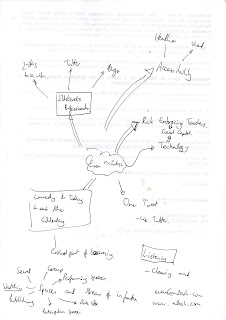The MAST programme, of which I am a part, has a rather confusing array of places to store information. There are discussion areas, chat rooms and an online journal, which all exist on Blackboard, Edge Hill University's virtual learning environment. In addition there is a personal learning log which exists as a downloadable Word file, but is also handed out in hardcopy at local area meetings. And there is a rather large ring binder file to go with it. My own principle is that I need just one place to put things and it is right here ( a principle that I set out in my first post: 'Starting in One Place').
Mysterious Maths
Having a mathematician for a father meant that maths always held a slight air of mystery to me as a child. It was his job and his passion. A bit like Gandalf in 'The Hobbit' - an appropriate metaphor as my dad has an affinity for (and a beard like), Tolkien's famous wizard. So, just as you always get the idea that Gandalf knows more than anyone else does about what's going on, while Bilbo (the hobbit) and the thirteen dwarves all trundle from one problematic frying pan into yet another life-threatening fire, it was the same with my father and maths. I always had the idea that it was marvellous, mysterious and magical - yet he would always know a little bit more than me. And he still does.
Triumphs and Failures
I've had various mathematical landmarks. The Year 4 teacher who managed to teach me long division was an inspiration - my maths really took off under her wing. Then at secondary school an over-reliance on rote and the calculator (I distinctly remember typing 2+2= while trying to solve one problem when I was about 13) meant that I often failed to see the big picture of what I was trying to work out, seeing only the taught method instead. This is something I strive against as a primary teacher - I want children to have a concept of what they are doing to number when they use a method, but as the methods got more and more advanced at 'A' levels, the maths got more and more disconnected from real life for me and I struggled to 'get it'. While I achieved a 'B' in maths 'A' level, I only scraped an 'E' in further maths and I continued to struggle with maths through university (electrical engineering) - being able to just about manage the methods of second order differentiation, but not really understand why I was doing it - I certainly can't remember much of that level of maths now.
Pedagogical Prescription
It was primary teaching and particularly the national numeracy strategy with it's emphasis on mental methods above written ones that brought enthusiasm back for maths. Some people complain about the prescriptive nature of the primary curriculum, referring to the written methods that are taught, but I never really got stuck on that, choosing to bring myself and children back to the mental methods whenever I could. Over the last five years as a maths leader, I have tried to instill this 'mental methods first' ethos in my colleagues and it is here that my interest in school leadership really began (although that really is another story) because I discovered it is far easier to change children as a class teacher than when you're not a class teacher...
My current big question in maths is: 'Is there one successful pedagogy for all groups of children?" By this I mean, can you teach all children using just one approach (as the national numeracy strategy back in1996 hoped)? I suspect that the answer is 'no':
- less able groups of children need a sccaled down approach with an emphasis on basic number skills;
- middle ability groups need the kind of approach advocated in the national numeracy strategy with a progression of methods that build on previous ones, leading to formal written methods;
- more able children need a variety of methods and should be given opportunities to use and apply them independently to different situations.







